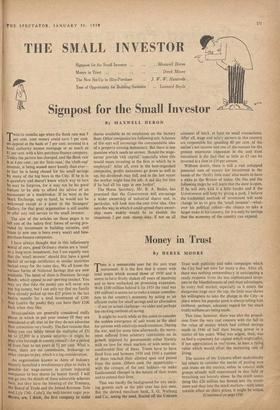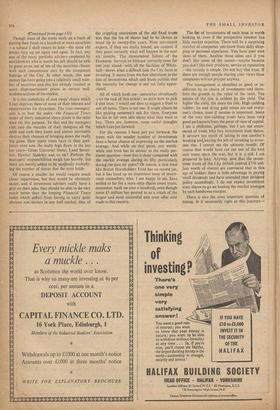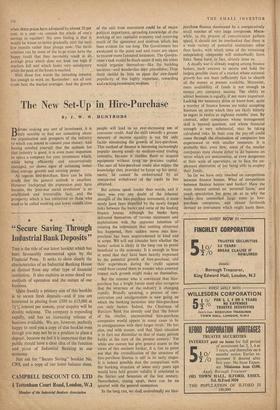Money in Trust
By DEREK MOORE THIS is a memorable year for the unit trust movement. It is the first that it enters with total assets which exceed those of 1939 and it seems to have firmly shaken off years of inactivity and to have embarked on promising expansion. With £100 million behind it (in 1939 the total was £80 million) is seems set to make a major contribu- tion to the country's economy by acting as an efficient outlet for small savings and an alternative —if not an actual challenge—to older and perhaps less exciting methods of saving.
It might be worth while at this point to consider the sudden emergence of unit trusts as the ideal for persons with relatively small resources. During the war, and for some time afterwards, the move- ment suffered from arbitrary restrictions on its growth imposed by governments either 'frankly with no love for stock markets or with some un- comfortable •fear of them. Trusts have to have fixed lives and between 1939 and 1950 a number of them reached their allotted span and passed from the scene. Others took the opportunity— with the consent of the unit holders—to make fundamental changeS in the nature of their trusts and to extend their lives. • That was hardly the background for any excit- ing growth such as the pgst year has just seen. But the shrewd merchant bank, S. G. Warburg and Co., seeing the need, floated off the Unicorn
Trust with publicity and sales campaigns which the City had not seen for many a day. After all, there was nothing extraordinary in anticipating a ready response from the less sophisticated inves- tors to the blandishments of unit trust advantages. In every bull market, especially as it enters the dangerous stage near the top, the little man shows his willingness to take the plunge in the City—a place where his popular press is always telling him (without, perhaps, adequate regard for the exact truth) millions are being made.
This time, however, there was also the propul- sion from the very real concern with the fall in the value of money which had robbed savings made in 1946 of half their buying power in a matter of ten years. What was urgent, then, was to find a repository for capital which might. offer, if not appreciation in real' terms, at least a rising value which would offset the increasing cost .of living.
The success of the Unicorn effort undoubtedly led others to consider the merits of putting new unit trusts on the market, either in concert with groups already well experienced in that field or branching out bravely alone. In the result some- thing like £20 million has flowed into the move- ment and thus into the stock markets—with some notable effect on share prices, it might be added.
(Continued on page 154) (Continued from page 151) Though most of the trusts work on a basis of putting their funds in a hundred or more securities —a subject I shall return to later—the same old names turn up yet again and again. In fact, any one of the many portfolio advisers employed by stockbrokers who is worth his salt should be able to guess seven out of ten of the securities chosen with such consummate care by the investment bigwigs of the City. In other words, this new money has been going into a relatively small num- ber of securities and this has already resulted in some disproportionate prices in certain well- trodden sections of the market.
It is this catholicity of unit trusts' choice which I feel deprives them of some of their interest and opportunities for dynamism. The trust-managers' aim is to beat the index—the Financial Times index of thirty industrial share prices is the most used for this purpose. To that end the managers tam into the muzzles of their shotguns all the odds and ends they know and almost inevitably destroy their chances of bringing down the really big game. How many trusts have in their port- folios even now the really high flyers in the last ten years—Great Universal Stores, Land Securi- ties, Hawker Siddeley and so on? Perhaps the managers' responsibilities weigh too heavily, but these are merely added to by needlessly multiply- ing the number of shares that the trust holds.
Of course a smaller list would require much closer supervision, but that would be obviously easier, and if investment advisers really have a grip on their jobs, they should be able to do very much better than the limping Financial Times index which suffers from having to carry quite obvious non-starters in any bull market. One of the crippling restrictions of the old fixed trusts was that the list of shares had to be chosen to stand up to twenty-five years. Most investment experts, if they are really honest, are content if they guess correctly what will happen in the next six months. The monumental failure of the Economic Surveys to forecast correctly even for one year ahead—with all the facilities of White- hall—shows what a difficult task the City faces in investing. It seems from the few alterations in .the lists of investments which unit trusts publish that the necessity for change is not' yet. fully appre- ciated.
All of which leads me—somewhat circuitously —to the task of this artiele: to show how to pick a unit trust. I would not dare to suggest a trust to suit all tastes. There is not one. It might almost be like picking someone's suit for them. Everyone has his or her own idea about what they want to buy. There are, however, some useful thoughts which I can put forward. .
For the reasons I have just put forward, the trusts with the smaller number of investments have a better chance of improving on the market average. And while on that point, any worth- while unit trust has its answer to the really per- tinent question—how has it done compared with the market average during its life, particularly during the •past six years? 01- course, a new trust like British Shareholders Trust has no record yet, but it has lined up an impressive team of invest- ment counsellors, who, I am happy to see, have settled so far for a mere sixty shares (most trusts, remember, bank on over a hundred), even though some £5 million has poured in as a result of the largest and most successful unit trust offer ever made in this country.
The list of investments of each trust is worth looking at, even if the prospective investor has little market expertise. There will be a surprising number of companies you know from daily shop-. ping or personal experience. You have your own ideas of them. Analyse those ideas and if you don't like some of 'the names—maybe because you don't like their products, service or reputation —the remedy is simple. Do not buy that trust. If there are enough people sharing your views these companies will not prosper anyway.
The management is identified as good or in- different by its choice of investments and there- fore the growth in the value of the units. The nature of the risk is evident by the yield. The higher the yield, the more the risk. High-yielding rubber, tin and dying gold mines are not every- one's choice, even if income is important. Some of the very low-yielding trusts have been very good performers from the point of view of capital. I am a philistine, perhaps, but I am not enam- oured of trusts who buy investment trust shares. It savours too much of taking in one another's washing andileaving the job of investing to some- one else. I cannot see the ultimate benefit. Of course that would have cut out one of the best unit trusts since the war, but it is a risk I am prepared to take. Anyway, now that the invest- ment trusts of the City (Which control £750 mil- lion worth of shares) are convinced that in this age of bidders there is little advantage in paying small dividends and have amended their dividend policy accordingly, I do not expect investment trust shares to go on beating the market averages by such handsome margins.
There is also the most important question of timing. Is it necessarily right at this juncture-
when share prices have advanced by almost 50 per cent. in a year—to commit the _whole of one's savings to equities? My own feeling is that it would be wisest to invest gradually over the next few months rather than plunge now The thrift schemes run by most of the large trusts have the happy result that they inevitably result in
ait-
average price which 'does not took too high if markets fall and which looks very satisfactory when the peak of the boom is reached. With those few words the intending investor has enough to work on. 'Remember : not all unit trusts beat the market averages. And the growth of the unit trust movement could be of major political importance, spreading .knowledge of Ale working of our capitalist economy and removing much of the ignorance and mistrust which has been evident for too long. The Government has awakened to the point and unit trusts are about to receive more favoured treatment. The govern- ment's task would be Much easier if only the trusts would organise themselves—like the building societies—and standardise their procedures. Then there should be little to 'upset the new-found popularity of this highly important, rewarding and exicitinginvestment medium.












































 Previous page
Previous page